Authentic Shrimp Lo Mein (VIDEO)
This post may contain affiliate links. Please read our disclosure policy.
Shrimp Lo Mein is a Chinese restaurant classic – chewy, bouncy lo mein noodles are cooked in a savory sauce with juicy, tender shrimp and perfectly cooked vegetables! But did you know you can easily recreate an authentic, restaurant quality Shrimp Lo Mein at home in just 30 minutes?!
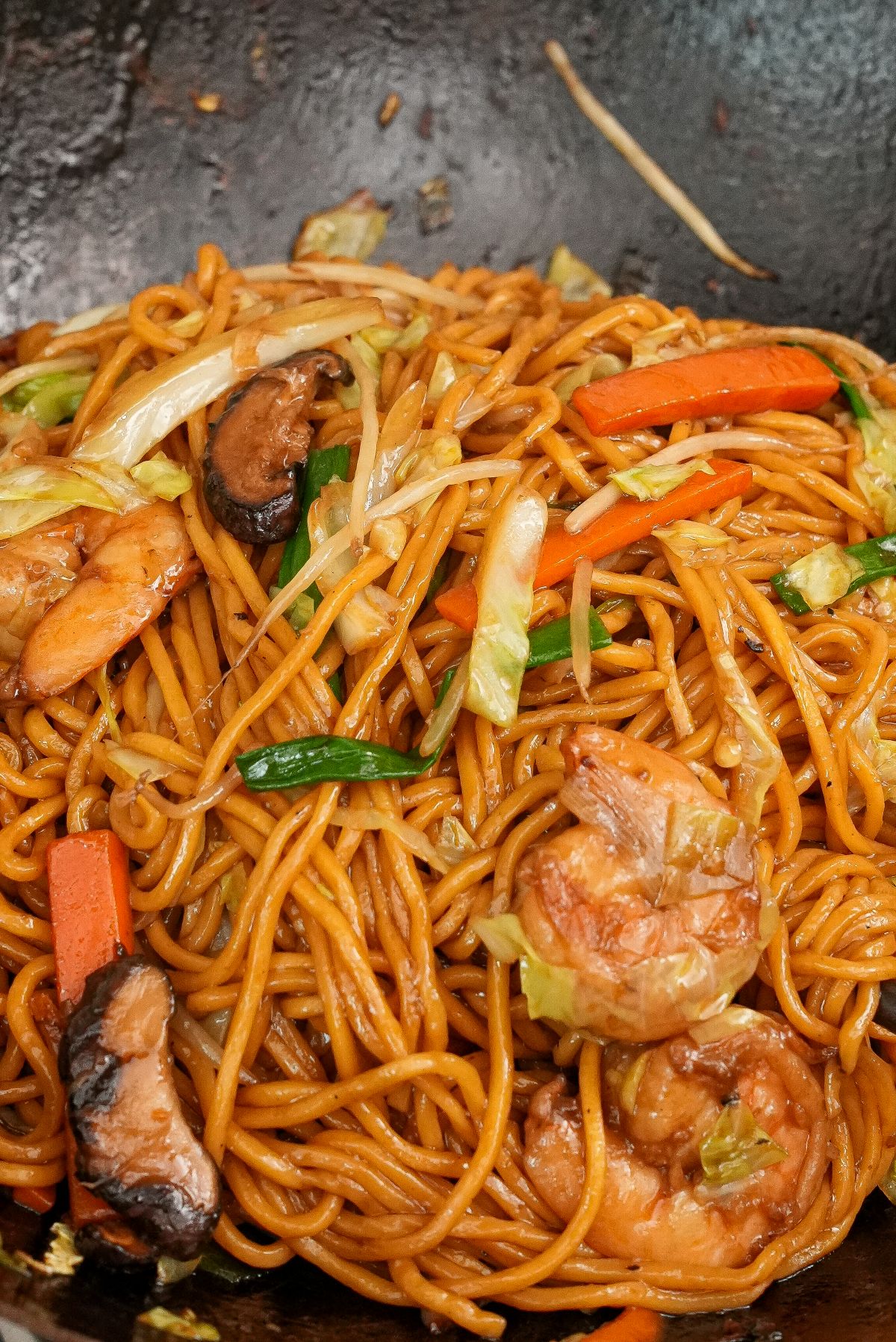
Watch the Shrimp Lo Mein Recipe Video!
A Note from CJ
Make a restaurant quality Shrimp Lo Mein!

It’s so much easier than you would think to make a better-than-takeout Shrimp Lo Mein at home! The shrimp are juicy and tender, the noodles are bouncy (not overcooked!) and the vegetables have a great bite to them! Serve it alongside your favorite Chinese takeout dishes like Egg Rolls, Egg Drop Soup or Hot and Sour Soup! Chicken Fried Rice (or Shrimp Fried Rice), Egg Fried Rice, Mushroom Fried Rice, Sesame Chicken or Black Pepper Chicken. Din Tai Fung Cucumber Salad or Din Tai Fung Garlic Green Beans!
Fabulous! My whole family loved this recipe. Just like eating out.
Ingredient Tips
- noodles – I use fresh lo mein noodles (not cooked) by the brand “Twin Marquis”, which can be found in the refrigerated section at my local Asian grocery.If you can’t find fresh lo mein noodles, you can use another thick long noodle of your choice (even spaghetti has worked for me in a pinch)!
- shrimp – this is raw, deveined shrimp. You can use any size shrimp of your preference.
- oyster sauce – my favorite oyster sauce is by Lee Kum Kee, with the lady on the label (use this over the one with the panda on the label).
- dark soy sauce – dark soy sauce is thicker, used to add color and a richer, more intense flavor.
- shaoxing wine – this is a staple in Chinese cooking and I recommend having a bottle in your pantry; if you don’t have it, you can substitute with sherry, mirin, or even chicken stock.
- msg – I use MSG in moderation as a flavor enhancer; this is optional.
How to Make Shrimp Lo Mein
Marinate Shrimp, Mix Sauce, and Cook Noodles – by patting them dry and seasoning with salt, white pepper, light soy sauce, baking soda, shaoxing wine, cornstarch, and a little oil. Mix well and let them rest for 15 minutes while you prep the remaining ingredients. In a small bowl, whisk together soy sauce, oyster sauce, dark soy sauce, shaoxing wine, sesame oil, white pepper, sugar, water, cornstarch, and MSG until the sugar and cornstarch dissolve and the sauce is smooth. Cook the lo mein noodles 2 minutes shy of the package instructions, rinse under cold water, drain thoroughly, and toss with a bit of sesame oil to prevent sticking.
Stir Fry The Shrimp, Vegetables, and Lo Mein – Heat oil in a wok over high heat and sear the marinated shrimp for 2–3 minutes until just cooked, then set aside. In the same wok, briefly sauté garlic and ginger, then add scallion whites, carrots, cabbage, onions, and mushrooms. Stir-fry over high heat for 2–3 minutes until slightly wilted, then add the noodles, shrimp, and sauce. Toss everything together for 1–2 minutes until the sauce thickens and coats the noodles evenly. Finish with scallion greens and bean sprouts, stir-fry for another minute, and enjoy!
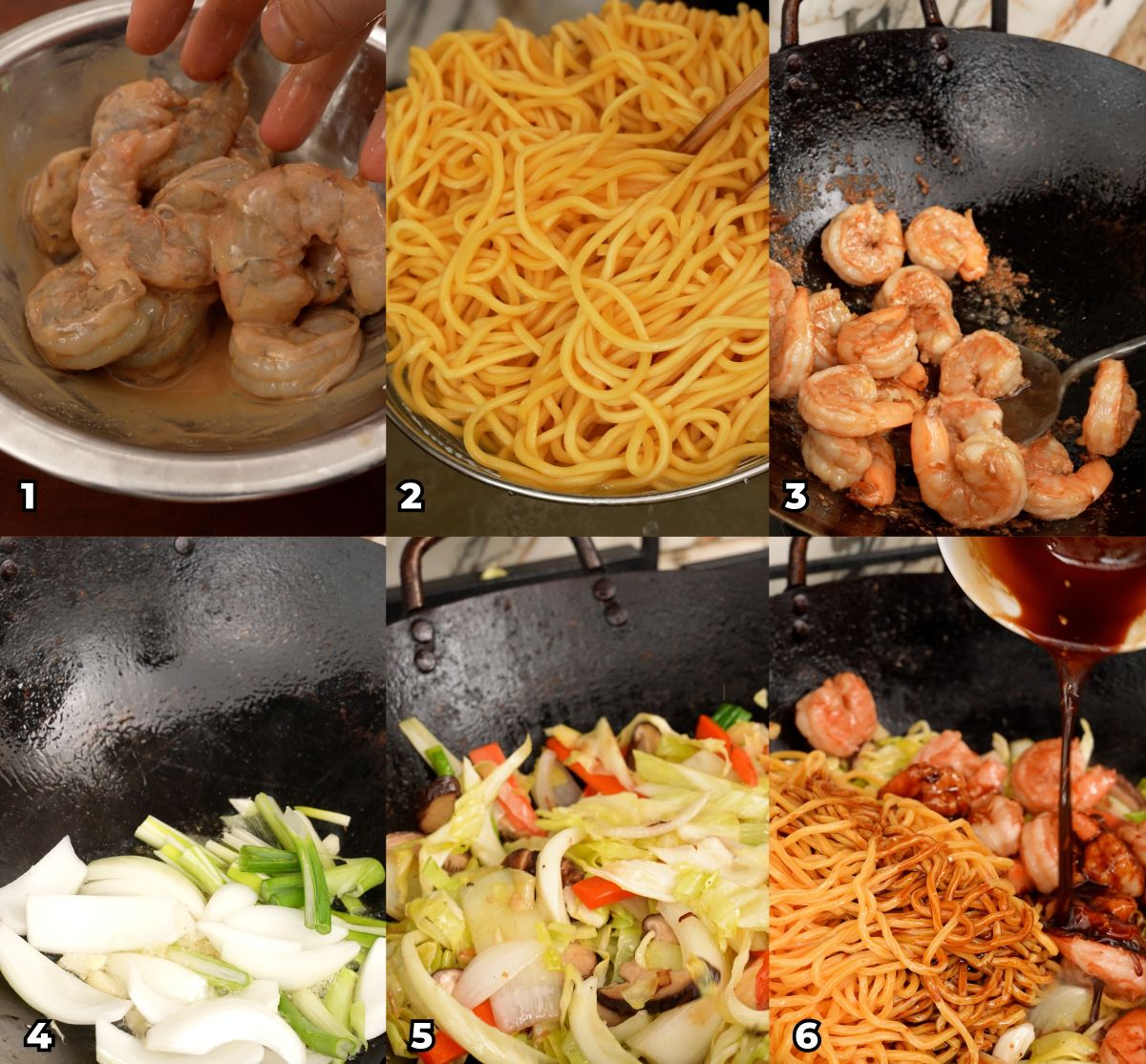
PRO TIPS
CJ’s Recipe & Storage Tips
Cut the Vegetable into Similar Sizes so they cook evenly – this little step makes a huge difference!
Noodle Tips – Undercook the noodles – I always cook my lo mein noodles 1-2 min less than the package instructions, as they’ll continue to cook when added into the pan with the rest of the ingredients. Rinse the noodles and toss them in sesame oil – After boiling, rinse the noodles immediately with cold water to stop the cooking. Shake them dry and then toss in a tablespoon of sesame oil to prevent the noodles from sticking.
Storage and Reheating – Store any leftover Shrimp Lo Mein in an air tight container in the refrigerator for up to 3 days. To reheat, cover with a damp paper towel and reheat until the noodles and beef are warmed through. The damp paper towel with create steam to reheat (but not overcook) the noodles!
If you tried this Shrimp Lo Mein or any other recipe on my website, please leave a 🌟 star rating and let me know how it went in the comments below!
Shrimp Lo Mein (VIDEO)
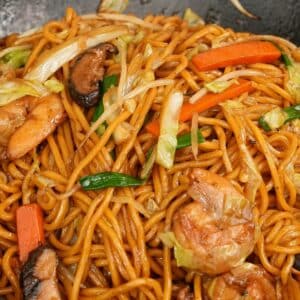
Equipment
Ingredients
Shrimp
- 1 lb shrimp
- 1/2 tsp salt
- 1/4 tsp white pepper
- 1 tbsp light soy sauce, low sodium
- 1/4 tsp baking soda
- 1 tsp shaoxing wine
- 1/2 tbsp cornstarch
- 1/2 tbsp neutral oil, I used avocado oil
Lo Mein Sauce
- 2 tbsp light soy sauce, low sodium
- 1 tbsp oyster sauce
- 1 tbsp dark soy sauce
- 1 tbsp shaoxing wine
- 1 tsp sesame oil
- 1/4 tsp white pepper
- 1/2 tbsp sugar
- 1 tbsp water
- 1/2 tbsp cornstarch
- 1/4 tsp msg, optional
Noodles
- 16 oz lo mein noodles, fresh or dried
- 1/2 tsp sesame oil, optional
Oil & Vegetables
- 3 tbsp neutral oil, I used avocado oil
- 5 cloves garlic, minced
- 1 tbsp ginger, minced
- 5 scallions, chopped, greens and whites separated
- 1 carrot, medium, cut to strips
- 3 cups cabbage, sliced
- 1/2 white onion, sliced
- 6 shiitake mushrooms, sliced
- 2 cups bean sprouts
Instructions
- Pat the shrimp dry with a paper towel and place them in a bowl. Marinate with salt, white pepper, light soy sauce, baking soda, shaoxing wine, cornstarch and oil. Let marinate for 15 minutes while you prepare the rest of your ingredients.
- In a small bowl, make the sauce by adding soy sauce, oyster sauce, dark soy sauce, shaoxing wine, sesame oil, white pepper, sugar, water, cornstarch and msg. Mix until the cornstarch and sugar is dissolved.
- Bring a large pot of water to a boil over high heat. Cook the lo mein noodles 2 minutes less than package directions, drain, then rinse with cold water and drain dry. Coat the noodles with sesame oil to prevent sticking.
- In a large wok or pan, heat 3 tbsp of oil over high heat until just smoking. Sear the shrimp for 2-3 minutes or until cooked through and set aside.
- In the same oil, sauté the garlic and ginger for 15 seconds over medium high heat. Add the scallion whites, carrot, cabbage, white onion, and mushrooms. Turn the heat to high and sauté for a 2-3 minutes until slightly wilted, then add the noodles, shrimp, and sauce and mix thoroughly. Continue cooking for 1-2 minutes until the sauce has thickened and is evenly coated. Add scallion greens and bean sprouts, mix and stir fry for another minute and enjoy!
Video
Notes
- I use fresh lo mein noodles (I recommend the fresh, uncooked version) by the brand “Twin Marquis”, which can be found in the refrigerated section at my local Asian grocery.If you can’t find fresh lo mein noodles, you can use another thick long noodle of your choice (even spaghetti has worked for me in a pinch)!
Nutrition
Nutrition information is automatically calculated, so should only be used as an approximation.
This Shrimp Lo Mein recipe was originally published in January 2023, and updated in December 2025.

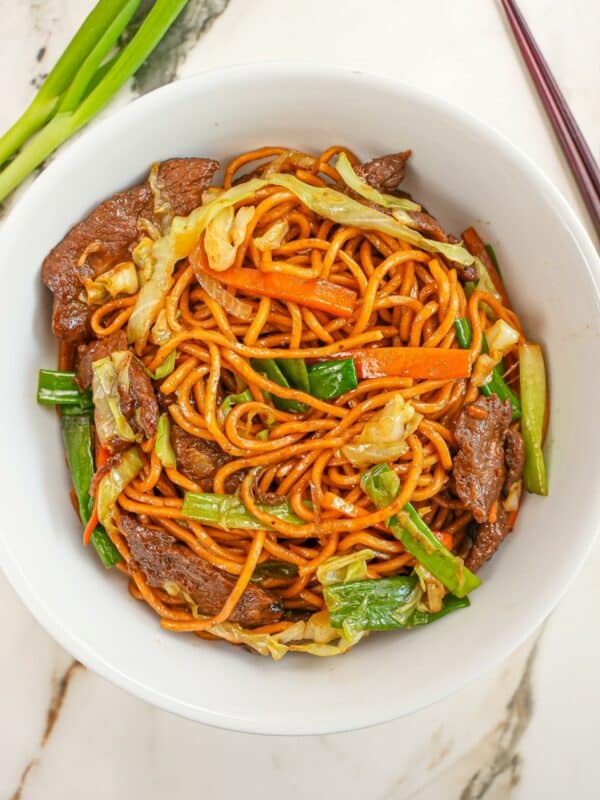
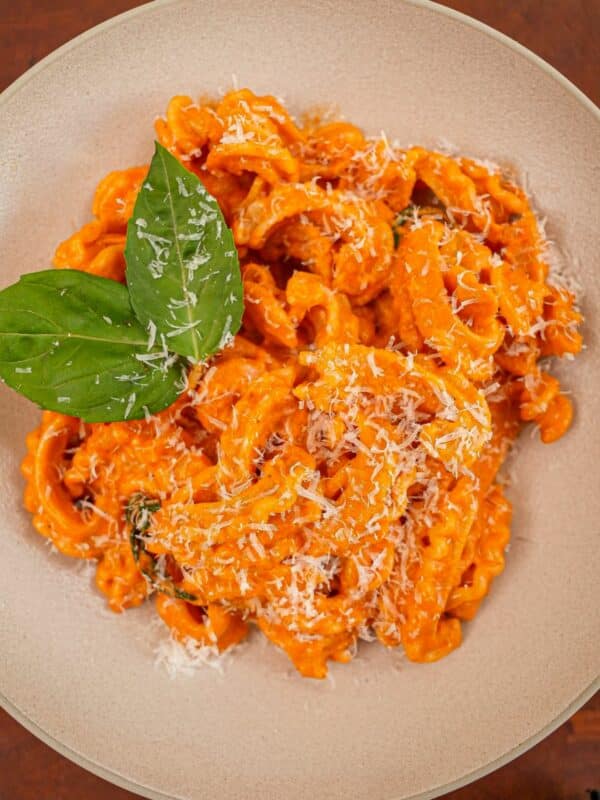
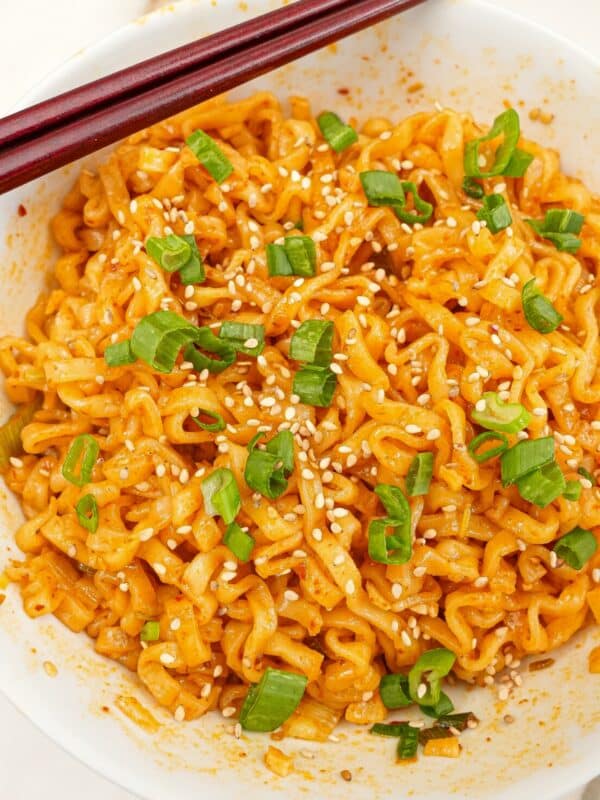
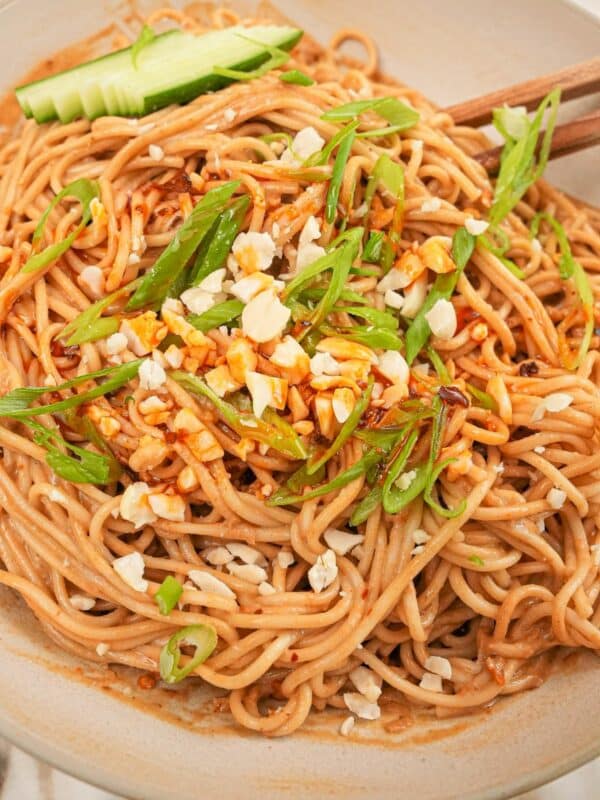







Super Flexible and Delicious. Once you purchase the basic sauce ingredients (which last a long time), you can easily substitute any protein or vegetables you have on hand; reduces food waste. I really appreciate your instructional videos too.
Love this recipe! Easy and full of flavor and veggies!
The instructions were very easy to follow and my family destroyed this lo mein. I did swap out mushrooms for sugar snap peas, I have two boys that depise mushrooms. Thank you for a great recipe!
Thank you so much, Coralie! I hope it makes it into your rotation!
I made this Lo Mien so many times for my family and never failed!!! It was delicious 😋. Perfect combination of the sauce make it different from other recipe. Thanks for sharing!
My mom didn’t like lo mein until I made this recipe
Love this recipe. Quick and easy weeknight meal and great way to use veggies that have been sitting in the fridge! Everything goes well with saucey noodles!
Made this recipe many times! Never fails and always delicious. Thank you for sharing!
Made this for the first time and it was perfect! Thanks for your recipe 😉
Thanks so much, Gerrie! I’m glad you enjoyed it 🙂
I can’t eat shellfish. Got any ideas to substitute something else for the shrimp? And what is shoaxing wine? And what could be the substitute for it if I can’t find it?
Thanks so much, i Saw You from Guatemala, since QUETZALTENANGO Town, i ‘ve learned a lot of Corean Food.